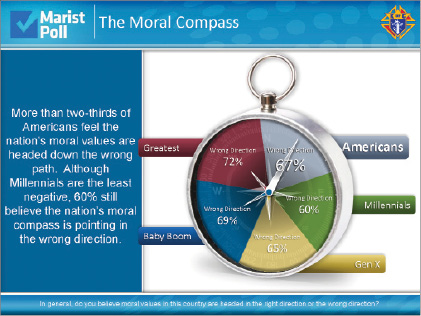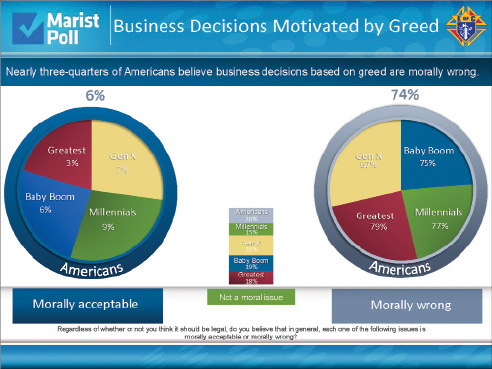


![]()
ONLINE

The Millennial Generation
Editors’ Note
Carl Anderson assumed his current post in 2000. Prior to this, he served in various White House positions from 1983 to 1987, including Special Assistant to the President of the United States and acting Director of the White House Office of Public Liaison, and served for nearly a decade as a member of the U.S. Commission on Civil Rights. He has been Vice President of the Pontifical John Paul II Institute for Studies on Marriage and Family in Washington, D.C. since 1988, and serves on a number of advisory bodies at the Vatican, including the Pontifical Council for the Laity, the Pontifical Council for the Family, and the Pontifical Council for Justice and Peace. He earned degrees in philosophy from Seattle University and in law from the University of Denver, and is author of New York Times bestselling books, A Civilization of Love and Our Lady of Guadalupe: Mother of the Civilization of Love.
Organization Brief
The Knights of Columbus (www.kofc.org) was founded in 1882 as a fraternal benefit society to assist widows and orphans. It has since grown to become the world’s largest Catholic lay organization, with 1.75 million members in the United States, Canada, Mexico, Poland, the Philippines, and the Caribbean. As an insurance company for members and their families, the Knights has consistently received the highest ratings from Standard & Poor’s, A.M. Best Company, and the Insurance Marketplace Standards Association (IMSA). The Knights of Columbus has more than $70 billion of life insurance in force covering its members and their families. The order has focused on charity to neighbors and communities throughout its history.
At the beginning of the year, the Knights of Columbus completed a survey, in partnership with the Marist College Institute for Public Opinion, of American Millennials, those age 18 to 29. As a volunteer organization, why does the Knights of Columbus want to know Americans’ views on the moral direction of the country, and specifically, why the views of Millennials?
The Millennial Generation is an increasingly large part of the workforce and represents tomorrow’s business leaders. As such, their views on moral issues, especially regarding the economy, are very important both in discerning the possibility of creating a truly sustainable economy and in terms of creating a genuine and meaningful dialogue that spans the generations.
We’re a volunteer organization, but we also run a large, top-rated insurance operation and our charitable works go hand in hand with the strength of our highly rated products. From the beginning, we’ve believed that a company can achieve economic success, not in addition to, but holding to high ethical standards and promoting the common good.
What we have found is that Americans – including the next generation of businessmen and women – agree. In fact, those who hold this belief are the majority. They must now decide whether they want to repeat the mistakes of the past or lead into a future that holds the promise of real change, of the ethical underpinnings that Americans clearly want.
What characteristics of the Millennial Generation strike you the most?
Overall, the youngest Americans in the workforce have aspirations – and fears – that track closely with the rest of the American population. They believe the nation’s moral compass is pointing in the wrong direction. And they’ve lost faith in the government’s ability to handle the crisis – as have most Americans. A majority believes that more government regulation will hinder economic recovery, not help it. And overwhelmingly, this group, like the rest of the country, sees a disconnect between people’s standards of ethics in business and in their personal lives – and doesn’t like it.
But it’s also worth noting that this group defines itself more than anything else as hardworking, and that is certainly a hopeful sign.

In terms of career and overall life priorities, what do young Americans want?
As a generation that describes itself as “hardworking” and names money and finances as the top problem it faces, Millennials highly value being able to balance work and family. They want job security, but also having a work/life balance strongly appeals to them, as do flexible hours and work-from-home options – much more so than a high-earning career track.
They are not unlike the rest of the population in that they also want common sense from the public and private sector. They don’t want sleight of hand on Wall Street – or a heavy hand from Washington. They want a system with a foundation that they can believe in, an ethical and transparent system, and they expect that overall, as hard-workers, things will ultimately go well for them.
How do you think the current economic climate is shaping America’s future business leaders?
At a rate that is even slightly higher than the general U.S. population (77 percent compared to 74 percent), Millennials are surveying the current crisis from the standpoint that business decisions based on greed are morally wrong. Likewise, two-thirds of Millennials believe that the same ethical standards that govern a person’s life outside of work should also be applied to the business realm.
Even though they have the longest time to recover from today’s problems, Millennials have been hit hard by this economy, and they know it. Well over half are worried about the effects on their careers. But they also have a healthy optimism about the future.
It is possible that this current economic crisis could teach them some very valuable lessons about how to conduct business, how not to conduct business, and how to make the sorts of business decisions in their own careers that will promote sustainable growth.
Do you think we’re seeing the emergence of another Greatest Generation?
Of course it’s hard to say that one generation will be like another in a particular way, but the Millennial Generation certainly has the potential to be great. And if they are able to learn valuable lessons from the current economic crisis, they may better avoid similar mistakes.
We can talk about the ways in which Millennials are different from their grandparents’ generation, but there are broad similarities. Overall, Millennials, like their grandparents, see a sense of closeness and marriage as their top priorities – the Greatest Generation placed more emphasis on marriage and Millennials place more on spirituality. But broadly, they share those priorities.
Like the Greatest Generation, the majority of Millennials think the country is headed in the wrong direction morally, but they think so in fewer numbers: they are more optimistic in a way.
What it will come down to is their sense of personal responsibility. Millennials identify themselves more as hardworking and less as conservative compared to the Greatest Generation. And it is their belief in the work ethic that is a hallmark of the American character that is very heartening.
Most Millennials weren’t in the positions of authority that helped cause this crash, but whether on Main Street or Wall Street, they will be the builders of a business world in a post-2008 economy. If they recognize the potential of the position they are in and assume the responsibility of laying the foundation for an economy that the majority of them believe in – one in which business decisions take into consideration the common good – then Millennials can lead America somewhere great.
Despite their dire outlook on the nation’s current path, Millennials are still optimistic about their own economic future – much more so than Gen Xers and the Baby Boomers. What is at the heart of this?
Certainly one reason they could be more optimistic is that the problems we face today can be overcome in time for them to move forward with their lives.
But it’s deeper than that. They are idealistic, but they aren’t naïve. They think – in numbers much larger than among Generation X or the Baby Boomers – that they will be better off than their parents. This is another trait they share in common with the Greatest Generation.
But they also think their careers will be hurt by this economy, so I think they have exhibited a very mature sense of balance in this way. They have optimism for the long-term future, but caution and concern about the present and immediate future.

For full results of the Knights of Columbus/Marist poll of American Millennials, go to kofc.org/moralcompass
Six in ten Millennials said the religious beliefs and values of a business executive should influence his or her business decisions at least
somewhat. How has your experience as
Supreme Knight/CEO of the Knights of Columbus shaped your thoughts on the relationship between faith and business practices?
If we want a return of ethics and morals to business, then a business executive’s faith should also be respected. Let’s be clear: We are talking about bringing the values taught by religion into the boardroom, not debating the finer points of theology there.
We’re talking about the faith-based mandates everyone can agree on – like concern for your neighbor or taking responsibility for those around you, or not making decisions that benefit yourself at the expense of everyone else. This sort of ethic is what is needed to overcome what Americans know has gone wrong in their country, and our polling shows that the overwhelming majority of Americans – and Millennials – agree.
At the Knights of Columbus, we hold our insurance practices to a very high ethical standard, and our ratings have reflected that: We are one of only a handful of life insurers to have the top rating from A.M. Best and Standard and Poor’s and ethical certification from the Insurance Marketplace Standards Association.
We have stringent ethical standards for our insurance and investment departments, and we have remained profitable during this turbulent economy because of – not in spite of – our ethical foundation.•